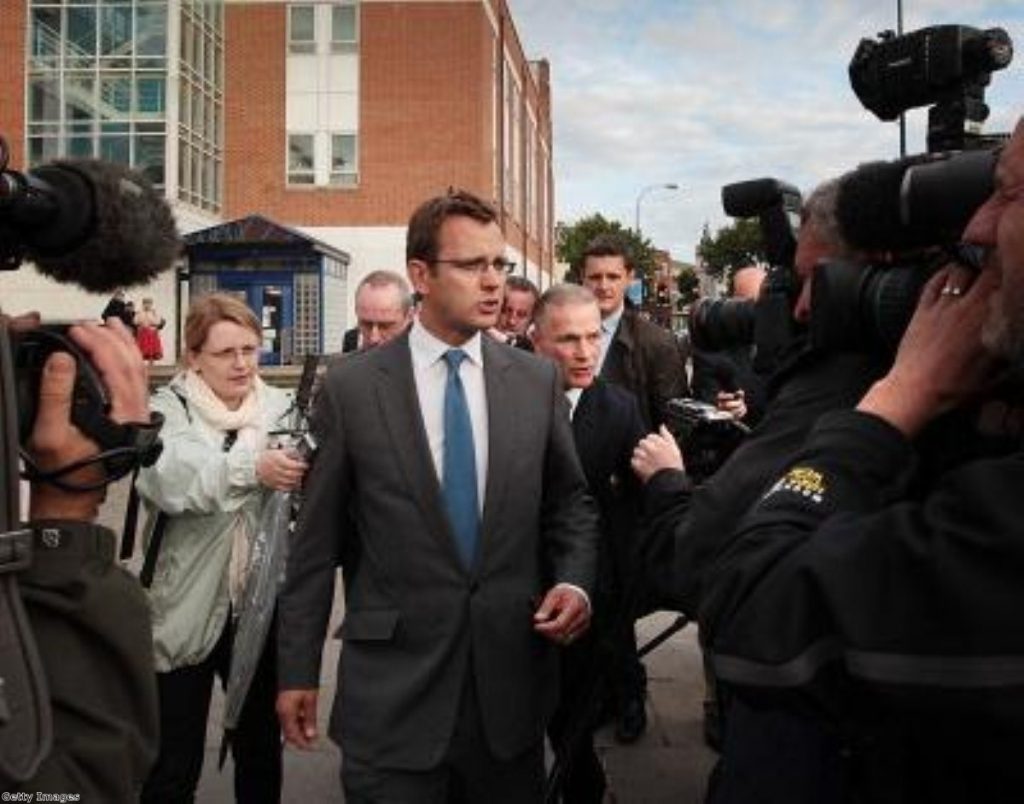Coulson–Brooks affair revealed in phone-hacking trial
A six-year affair between Rebekah Brooks and Andy Coulson has been revealed during the court case at the Old Bailey.
Rumours of the affair have long been known in Westminster circles, but it was impossible to report them due to legal concerns.
Neither defendant showed any reaction when details of the affair were revealed.
A letter from Brooks – apparently dated to 2004 when Coulson was trying to break off the affair – read: "You are my very best friend… I tell you everything… I confide in you, I love you, I care about you. Without our relationship in my life, I am not sure I will cope."


Politically, the discovery of the affairs raises questions about how close the link between the two continued to be in the years which followed it and throws further light on a professional and social network which flowed from Rupert Murdoch to Downing Street.
Prosecutor Andrew Edis told jurors he was revealing the affair in order to demonstrate that the two trusted each other and shared at least one secret.
"I'm going to tell you about something which I want to handle as carefully as I can," he said.
"But Mrs Brooks and Mr Coulson are charged with conspiracy and, when people are charged with conspiracy, the first question a jury has to answer is how well did they know each other? How much did they trust each other?
"And the fact that they were in this relationship which was a secret means that they trusted each other quite a lot with at least that secret and that's why we are telling you about it."
"What Mr Coulson knew, Mrs Brooks knew too," he added.
The affair was discovered by police due to a message contained on one of the computers confiscated from Brooks. It took place while she was married to Eastenders star Ross Kemp.
The court recently heard that three former news editors from the News of the World had pleaded guilty to conspiracy to hack mobile phones during a six-year period.
Edis opened the case for the prosecution yesterday by saying that News International's claim that phone-hacking was the work of one rogue reporter had been shown to be demonstrably incorrect.
"There is no doubt that initially News International was keen to say that phone hacking in the News of the World was really limited to [royal report Clive] Goodman but this inquiry has proved conclusively that that is not true," he told the jury.
"Either they were doing their jobs properly, or at least three – and we say four – of the news editors were running this operation with Glenn Mulcaire – a great deal of phone hacking – and the management never even noticed.
"There was phone hacking done for the benefit of the News of the World and at its expense. It started when Mrs Brooks was the editor and continued after Mr Coulson took over," he added.
"You will have to decide whether this could happen without the editor knowing.
"The News of the World was a Sunday newspaper. That means it published once a week, at most 52 times a year. It wasn't War and Peace. It wasn't an enormous document. It was the sort of publication if you were its editor you could take an interest in its contents without too much trouble."
The case comes amid a Mexican standoff over the new royal charter on press regulation , with figures from across the newspaper industry making it clear they will not sign up.
After last-minute legal challenges were rejected by the courts, the industry was forced to wait as a shadowy meeting of the privy council rubber-stamped the cross-party royal charter.
But newspapers cannot be forced to join and many have already ruled out doing so, in what could turn into a protracted stand-off between two competing regulators.
"Chances of us signing up for state interference: zero," the editor of the Daily Telegraph, Tony Gallagher, tweeted.
Roger Alton, executive editor of the Times, said: "It's extraordinarily depressing and very, very alarming that in one short spell a 100-year-old tradition of the press of this country, that's independent, free of political interference, has been cast aside."
Fraser Nelson, editor of the Spectator newspaper, said: "Now it's down to the newspapers to decide if they are going to sign up to this deeply illiberal proposal or whether they should stand up for press freedom."
The press insists its own regulator would anyway be the harshest in Europe, but it will not be able to protect media outlets from paying exemplary damages in cases of serious and persistent libel, as the cross-party regulator will.
In those cases newspapers may end up paying the damages regardless of whether they win or not.
But there are comparatively few libel cases which satisfy the high benchmark imposed for the exemplary damages and it is unclear if it will provide enough of a financial incentive to drive newspapers towards the state-backed charter.
It emerged today that yesterday's privy council meeting was attended by deputy prime minister Nick Clegg, health secretary Jeremy Hunt, Liberal Democrat peer Lord McNally, media secretary Maria Miller and the Queen.
Press representatives tried to stop the process with a call for an injunction in the high court. That was rejected and hours later the court of appeal turned down an interim order which would have acted as a holding strategy until a formal appeal could be lodged.
The privy council rejected the newspaper regulator because it failed standards of independence and access to arbitration.
The phone-hacking trial continues.

